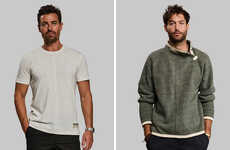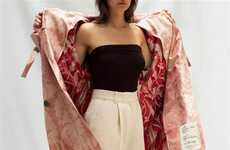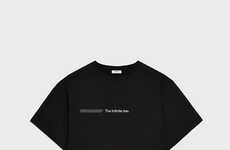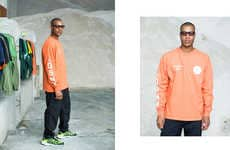
'I AM NOT A VIRGIN' Creates Recycled Clothes Using Discarded Plastic
Michael Hemsworth — October 5, 2016 — Eco
References: indiegogo
Fashion is often pointed out as being one of the most wasteful industries out there, so 'I AM NOT A VIRGIN' creates recycled clothes to help offer a different approach.
Creating high-quality garments made from recycled polyethylene terephthalate (PET), 'I AM NOT A VIRGIN' is able to ditch virgin materials like cotton. This makes the clothing inherently more sustainable by using materials that would otherwise end up in a landfill. The brand is even currently developing a new type of yarn that's made with a combination of PET and discarded rice husks.
'I AM NOT A VIRGIN' was created by Peter Heron and is a brand focused on delivering exceptional products that are environmentally conscious and comfortable to wear.
'I AM NOT A VIRGIN' is currently running an Indiegogo campaign where early adopters can get their hands on the brand's sweaters and help fund the company's future development.
Creating high-quality garments made from recycled polyethylene terephthalate (PET), 'I AM NOT A VIRGIN' is able to ditch virgin materials like cotton. This makes the clothing inherently more sustainable by using materials that would otherwise end up in a landfill. The brand is even currently developing a new type of yarn that's made with a combination of PET and discarded rice husks.
'I AM NOT A VIRGIN' was created by Peter Heron and is a brand focused on delivering exceptional products that are environmentally conscious and comfortable to wear.
'I AM NOT A VIRGIN' is currently running an Indiegogo campaign where early adopters can get their hands on the brand's sweaters and help fund the company's future development.
Trend Themes
1. Recycled Fashion - Creating high-quality garments made from recycled materials offers a more sustainable approach to fashion.
2. Alternative Materials - Developing new types of yarn made from discarded materials like rice husks presents disruptive innovation opportunities in the fashion industry.
3. Sustainability in Fashion - Increasing focus on environmentally conscious and comfortable clothing aligns with the growing demand for sustainable fashion.
Industry Implications
1. Fashion - The use of recycled materials and alternative yarns in clothing production has the potential to disrupt the traditional fashion industry.
2. Textile Recycling - The recycling of discarded plastic and other materials for clothing production creates opportunities for disruptive innovation in the textile recycling industry.
3. Sustainable Consumer Goods - The trend of producing sustainable fashion items appeals to the broader market for environmentally conscious consumer goods.
6.4
Score
Popularity
Activity
Freshness























